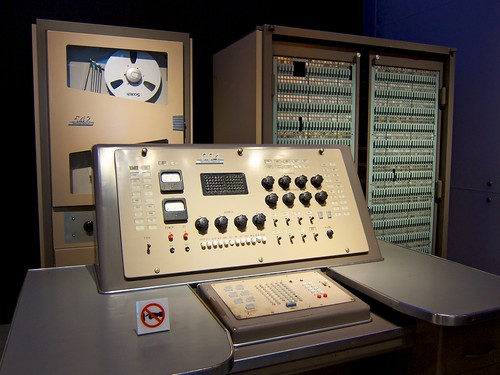Because we haven’t done one of these in a while; a Thought Experiment:
In the not-too-distant future a group of transit geeks invent the CompuTrans 3000*. It is the world’s most advanced method of analyzing and predicting the success or failure of a planned transit initiative based upon a series of metrics. It quickly establishes a name for itself given its near-perfect track record.
Very soon, the CompuTrans 3000’s inventors decide to open it up to the entire world by creating an online portal for it. Suddenly, any transit geek, planner, politician, community advocate, academic or anyone else interested has the opportunity to present their armchair transit plan to CT3 (as his nickname becomes) and have it vetted by the greatest known analytical tool ever yet marshalled in the industry.
Here’s the catch: You can use CompuTrans 3000 for free, but your idea – and it’s score – gets posted online in a leaderboard comparing the relative merits of one concept against another in a given geographic area.
In City X, the three plans that sit atop the leaderboard are:
- A plan by the city’s own transit agency that receives a score of 74%
- A plan by a noted transportation academic that receives a score of 78%
- A plan by an anonymous individual, group or business that receives a score of 94%
Which plan will City X’s transit agency choose to undertake, understanding that they have absolutely zero obligation to follow the prescribed actions of the CompuTrans 3000?
The answer, I suspect, says more about you and your relationship to the city you live in than anything else – and that’s the point.
There is, of course, no such thing as the CompuTrans 3000 and there likely isn’t to be such a thing any time in the near or distant future. But by imagining a world where the quality of a plan can be rationally analyzed fully completely, we’re freed to explore the very real reasons why the best plan might not be be selected for implementation.
And those reasons might be more important than the plan itself.
* Note: The CompuTrans 3000 was invented by the same people who developed the CableRailyGyroCopter.


8 Comments
I know it is just a thought experiment (just a thought experiment, geez, so were those Swiss patent clerk’s), but the thing is Steven, give me $500K and 12 months, and I’ll use it to award myself and 4 other top notch software engineers (who also have to be transport geeks) a pretty decent wage and we could write the CompuTrans 3000*. (OK, 5 programmer-years is enough to get the core of it written to be useful for a city, but then we’d be kept on for improving it, expanding it, tweaking the models, etc)
It’d end up modelling everybody in a city on an individual level, every bit of the transport infrastructure and its different qualities in a topographical and topological way, and be able to answer any transit related question you could throw at it, such as “what’s the optimal size of the park and ride at station X?” , or “what happens if I add a 7.34am service on this bus route?”, or “what happens if I change this bunch of services from these routes to these?”, or “what happens if we put in an aerial tram here?”
I, and I suspect other software engineers (who also have to be transport geeks), have had the same thought to write the exact same modelling software.
*obviously the name would have to be changed.
OK, any cities notice this and want to chat, ask Steven for my details.
If I had $500k, it’d be yours’, Matt.
As for the name change – obviously.
I also need a brand consultant to help me with the CableRailGyroCopter. Chinese Tunnel Bus™, however? That’s gold.
Not only would the city choose their own plan, in a way they’d be right to do so. The academic wouldn’t understand construction and political realities that might make a project successful. A business might be gaming the system for profit. An individual might be a complete crackpot with a great sounding but terrible idea.
This is why the inititive process scares me. In theory we should be electing officials that are professionals – they spend their lives figuring out the best solutions to problems, and hire professional staff to help them at this. All of these professionals understand in great detail any piece of legislation or transit plan that’s put before them (again, in theory). But you take the average voter, and they study an inititive for an hour if we’re lucky. Voters don’t have hours, days, or weeks to research every aspect of a plan or law before voting yes or no, so fairly bad plans often make it through.
On the other hand, inititives do produce innovation and sidestep politics. I’m not sure my state’s pot laws and gay marriage acts would have made it through our legislature without direct inititive. I’m not saying the process necessarily bad, more that it’s unpredictable. That said, maybe we have too much predictability in government.
” An individual might be a complete crackpot with a great sounding but terrible idea.”
Or an individual might come up with a really great idea that no one has thought of before.
Obviously all ideas should be filtered, but its origin shouldn’t be an issue, in-house or out-house, as the case may be. (Pun very much intended)
Not everyone in a position of power is going to have an understanding of every technology available. Look at the Gondola Project. It’s regular followers might get the central idea behind the blog, but your local city planners, or elected officials won’t necessarily be familiar with it. Same with blogs about cycling. Most cities would benefit hugely from widespread cycle path networks, but the expertise is largely inside the blogs and not in the city councils.
There is a role for amateurs, who often have a different, maybe more unorthodox, view of the world, but there is a wealth of knowledge there, hidden amongst the dross of the crackpots.
I agree with all of that. But I also came from a state with draconian criminal and immigration laws thanks to inititives combined with expensive ad campaigns, and currently live in a state completely paralyzed by anti-tax inititives that are always proposed by the same well funded individual. And my city spent $125M on an inititive-based transit project that had a poorly thought out funding scheme, which never even broke ground before failing.
Maybe the great benefits are worth these great costs. But it sure seems like there should be a better way.
(end link)
It’s such a complicated issue, which is why I tossed in the predictive mechanism of the CT3K. I like the idea that when we strip away the risk element, it really lays bare the motivations and reasons behind why we do things in certain ways. I’m not suggesting one way is better than the other, I just think it’s worth contemplating.
He looks like a particularly nasty member of his breed, the political conservative. Always with a new idea to stop progress.